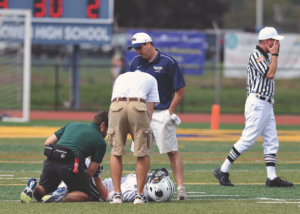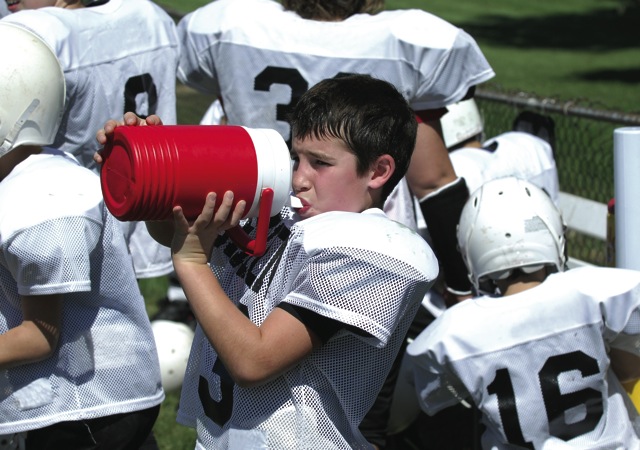Psychologically healing injured athletes
Because of the high demands placed on elite athletes, injury is virtually inescapable. With increasing early sport specialization comes a particular vulnerability to developmental and overuse injuries.
In 2013, an estimated 27 million athletes between the ages of 6 and 18 participated in team sports, and injury incidence averages were greater than 50 percent. With an increase of sport injury comes the need for increased knowledge regarding holistic wellness. So how do we keep our athletes healthy, both mentally and physically?
 When athletes get hurt, it’s not uncommon for them to experience negative emotional effects such as shock, anxiety, anger and guilt. It’s imperative that we not overlook this component of the injury experience — mind and body work hand-in-hand, in life and sport. And, if the goal of the sports medicine team is to return the injured athlete to participation at optimal performance, careful attention should be given to complete rehabilitation.
When athletes get hurt, it’s not uncommon for them to experience negative emotional effects such as shock, anxiety, anger and guilt. It’s imperative that we not overlook this component of the injury experience — mind and body work hand-in-hand, in life and sport. And, if the goal of the sports medicine team is to return the injured athlete to participation at optimal performance, careful attention should be given to complete rehabilitation.
To make any sort of change to injury mindset, we must first help the athlete recognize how they’re thinking. Cognitive restructuring involves:
- Awareness. Help the athlete recognize their internal dialogue and whether it’s positive or negative?
- Appraisal. Assess ways of modifying the athlete’s dialogue.
- Adoption/substitution. Help the athlete take control of their rehabilitation by adopting new thinking. Encourage permanence through repetition.
- Evaluation. Assess how changes in thought has affected rehabilitation outcome.
The power of self-talk
Given the negative emotional state experienced at injury onset by many athletes, negative self-talk may predominate thought. They might ask, “Why did this happen to me?” or “Am I ever going to rebound?”
Negative self-talk can serve as a self-fulfilling prophecy. The first step in modifying self-talk is recognizing moments during rehabilitation where negative cognitions are strong and potentially debilitating to patient recovery.
Cognitive restructuring is not a simple task, and change does not occur overnight. Just as sports medicine specialists work to improve the physical functioning of athletes, they must also work collectively to improve the mental state of athletes via implementation of psychological skills. Encouraging athletes to use self-talk with conviction might help productively shape the treatment session.
Positive self-talk can come in a number of forms. Helping injured athletes modify self-talk can lead to increased feelings of self-efficacy and confidence. Consequently, this can lead to improved performance. In the rehabilitation setting, improved performance might be evident via increased strength, range of motion and flexibility.
Positive changes in cognition can be implemented using a number of styles of self-talk.
- Self-encouragement. “I am making good progress in physical therapy.”
- Effort control. “Keep focused on the task at hand.”
- Performance goal achievement. “I really used my hamstrings in that glute raise, instead of relying on my quads.”
- General positive self-talk. “That was a great physical therapy session.”
Once efforts are made to address negative cognitions, the athlete can begin to engage in positive self-talk strategies. Such strategies encourage permanence with regards to cognitive restructuring, and they allow the athlete to take an active role in their psychological rehabilitation.
Here are four effective self-stalk strategies.
- Journaling. Have athletes keep a rehabilitation journal to increase awareness of positive and negative internal dialogue.
- Positive thought cards. At the end of each physical therapy session, have athletes write down one positive thing that happened during treatment. The cards can be strung together and referenced at times of frustration or at roadblocks in improvement.
- Thought-stopping. Encourage athletes to come up with a trigger to be used when thoughts turn negative. The trigger can be a word or action and should be used to redirect self-talk towards positive, constructive cognitions.
- The athlete’s litany. Have athletes create a list of positive phrases that can be said out loud to increase positive thought and confidence. The litany can be said before physical therapy to help shape treatment sessions, or after physical therapy to provide a boost.
Final thought
Sport psychology is founded on the belief that the mind and body are inherently connected. Thus, if the mental state of an athlete during rehabilitation is positive, the body may more readily respond to therapy.
Positive self-talk leads to positive affect. When athletes feel good, their minds are clear, and they’re better able to focus on the task at hand. By implementing cognitive restructuring and honing in on positive self-talk, it’s our hope that athletes can successfully achieve maximal level of functioning, both physically and mentally.
Kelsey Griffith is a performance and enhancement rehabilitation specialist at The Micheli Center for Sports Injury Prevention. Learn more at www.themichelicenter.com.
References
American Academy of Pediatrics Committee of Sports Medicine and Fitness. Intensive training and sports specialization in young athletes. Pediatrics. 2000; 106: 154-157.
Crossman, J. (1997). Psychological rehabilitation from sports injuries. Sports Medicine, 23, 333-339.
DiFiori JP, Benjamin HJ, Brenner, J, et al. Overuse injuries and burnout in youth sports: A position statement from the American Medical Society for Sports Medicine. Clin J Sports Med. 2013; 24(1): 3-20.
Ivarsson A, Johnson U, Podlog L. Psychological predictors of injury occurrence: a prospective investigation of professional Swedish soccer players. J Sport Rehabil 2013; 22: 19-26.
M. Murray. Springfield College: personal communication. 2014.
Taylor J, Taylor C. Psychology of dance. Champaign, Illinois: Human Kinetics, 1995.
Wadey R, Evans L, Hanton S, et al. An examination of hardiness throughout the sport injury process. British Journal Of Health Psychology [serial online].
2 thoughts on “Psychologically healing injured athletes”
Leave a Reply
You must be logged in to post a comment.






Good stuff, often overlooked. Have to put into practice on my next coaching job.
Wow, it’s interesting that you mention having positive thought cards after each therapy session to talk about one good thing during treatment that day. I never knew that such a task would improve how a patient viewed their physical therapy and themselves and help them over frustration. Thank you for the tips on self-talk strategies for when you are having psychological issues during your physical therapy.